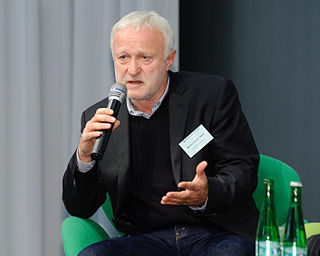
The German-speaking Community, also known as East Belgium, is one of the three federal communities of Belgium, with an area of 854 km2 (330 sq mi) in the Liège Province of Wallonia, including nine of the eleven municipalities of Eupen-Malmedy. The primary language of the community is German, making this the third official language in Belgium. Traditionally the community and the wider area around it forms an intersection of various local languages and/or dialects, namely Limburgish, Ripuarian and Moselle Franconian varieties. The community population numbers around 77,949 – about 7.0% of Liège Province and about 0.7% of the national total.
The Christian Social Party is a Christian-democratic political party operating in the German-speaking Community of Belgium. Its president is Luc Frank.

ProDG is a regionalist, Christian-democratic political party active in the German-speaking Community of Belgium. The party brings together politicians from the previous Party of German-speaking Belgians (PDB) and PJU parties. The party was formed in 2008 and first featured on the electoral ballot in 2009. Following the 2009 regional election, the party won four out of 25 seats in the Parliament and participated in the regional Government of the German-speaking Community of Belgium with two ministers. In the 2014 regional election, the party won six seats and its leader Oliver Paasch became the new minister-president.

Die Partei für Arbeit, Rechtsstaat, Tierschutz, Elitenförderung und basisdemokratische Initiative, or Die PARTEI, is a German political party. It was founded in 2004 by the editors of the German satirical magazine Titanic. It is led by Martin Sonneborn. In the 2014 European Parliament election, the party won a seat, marking the first time that a satirical party has won a seat to the European Parliament. With the 2019 European Parliament election, the party gained a second seat, held by Nico Semsrott.

Carlo Schmid was a German academic and politician of the Social Democratic Party of Germany (SPD).

Eupen-Malmedy is a small, predominantly German-speaking region in eastern Belgium. It consists of three administrative cantons around the towns of Eupen, Malmedy, and Sankt Vith which encompass some 730 square kilometres (280 sq mi). Elsewhere in Belgium, the region is commonly referred to as the East Cantons.

The Ulbricht Group was a group of exiled members of the Communist Party of Germany and the National Committee for a Free Germany, led by Walter Ulbricht, who flew from the Soviet Union back to Germany on April 30, 1945. Composed of functionaries from the KPD and ten anti-fascist prisoners of war, their job was to seek out anti-fascist individuals and prepare the groundwork for the re-establishment of communist organizations and unions in postwar Berlin. There were two additional regional groups, the Ackermann Group in Saxony and the Sobottka Group in Mecklenburg. Many of the group's members later became high-level officials in the government of the German Democratic Republic (GDR).
Bernard "Berni" Collas was a Belgian German-speaking politician and member of the liberal Party for Freedom and Progress. He was married and had three children.

Martin Hans Sonneborn is a German politician and Member of the European Parliament (MEP). He is a founder and federal chairman of Die PARTEI. He was editor-in-chief of the satirical magazine Titanic from 2000 to 2005 and works for Spiegel Online and ZDF.

The German Party was a national-conservative political party in West Germany active during the post-war years. The party's ideology appealed to sentiments of German nationalism and nostalgia for the German Empire.

Werner Gustav Schulz was a German politician of Alliance '90/The Greens. Trained in food technology at the Humboldt University of Berlin, he worked as a research assistant. He was an activist for peace ecology and human rights in several oppositional groups from the 1970s. He lost his university job in 1980 when he protested against the Soviet Invasion of Afghanistan. In the Peaceful Revolution, he was in 1989 a founding member of the New Forum, representing the group at the Round Table. He was elected to the first freely elected Volkskammer. After German reunification, he was a member of the German Bundestag from 1990 to 2005, and a member of the European Parliament (MEP) from 2009 to 2014.
Carola Stern was the name under which Erika Assmus reinvented herself as a serious journalist and (subsequently) author and politically committed television presenter, after she was obliged to relocate at short notice from East Germany to West Germany in 1951.

Karl Otto Hamann was a German politician. Between 1948 and 1952 he was chairman of the Liberal Democratic Party of (East) Germany (LDPD) and also the German Democratic Republic's Minister for Trade and Supply.

Dagmar Enkelmann is a German politician of Die Linke party.

The III. Path or The Third Path is a far-right and neo-Nazi political party in Germany.

Willi Birkelbach CBE was a West German politician (SPD). He was a member of the West German Bundestag between 1949 and 1964. Between 1952 and 1964 he also served as an increasingly prominent Member of the European Parliament.

Nina Scheer is a German lawyer and politician of the Social Democratic Party (SPD) who has been a member of the Bundestag since 2013. Her political interests include energy policy and climate change. In 2019, Scheer was an unsuccessful candidate in the 2019 Social Democratic Party of Germany leadership election, in a team with Karl Lauterbach. Her father was Hermann Scheer, also a SPD Bundestag member.
Inge Lammel, née Rackwitz was a German women musicologist, which dealt mainly with industrial folk music. She fled to Great Britain as a Jew in 1939 and became known for her work on the persecution of the Jews during the period of National Socialism in Berlin-Pankow.













